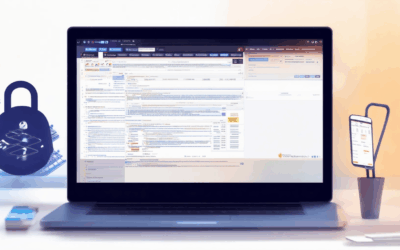In today’s increasingly digital world, data privacy for individuals has become a cornerstone of modern life. As our lives move further online, the protection of personal information has never been more critical. With the rise of cyber threats, data breaches, and invasive marketing tactics, securing one’s digital footprint has evolved into a vital concern for everyone. Understanding the nuances of data privacy isn’t just about compliance with laws—it’s about empowering individuals to take control of their personal data and ensuring their rights are upheld in an ever-evolving landscape. This article delves into the fundamental aspects of data privacy, exploring why it matters, what rights individuals possess, and how to navigate the complexities of modern data protection.
Key Takeaways
- Understand Your Data Privacy Rights: Familiarize yourself with essential rights like access, consent, erasure, and portability to control your personal information.
- Encryption Protects Your Data: Implement robust encryption to safeguard sensitive data from unauthorized access and misuse.
- Consent Drives Data Control: Exercise your right to consent, ensuring your preferences are respected for data usage.
- Transparency and Accountability Matter: Be informed about data collection practices and hold organizations accountable under regulations like GDPR and CCPA.
- Utilize Privacy Tools: Leverage tools like BlindBrowser to manage and secure your online presence effectively.
- Fight Surveillance with Privacy Laws: Data privacy reduces the risk of mass surveillance, safeguarding your digital identity.
- Legal Consequences for Non-Compliance: Organizations failing to protect data face penalties, emphasizing the importance of privacy compliance.

Data Privacy Importance
Data privacy is vital for individuals due to several critical reasons:
- Protection Against Identity Theft: Safeguarding personal information ensures that criminals cannot steal identities or commit financial fraud, protecting your money and credit history.
- Preventing Financial Fraud: Secure data management helps prevent unauthorized access to bank accounts, credit cards, and other financial instruments, reducing the risk of financial loss.
- Safeguarding Against Privacy Erosion: As digital tracking becomes more common, data privacy protects against invasive practices and ensures that personal information isn’t exploited without consent.
- Preserving Individual Freedoms: Data privacy safeguards against unwarranted surveillance and intrusions, preserving individual rights and freedoms from overreach by governments or corporations.
- Maintaining Reputational Integrity: A breach of personal data can tarnish one’s professional and personal reputation, potentially affecting relationships and career opportunities.
- Preventing Discrimination and Bias: Misuse of personal data can lead to discriminatory actions, impacting areas like employment, lending, and public services, which can disadvantage individuals unfairly.
To enhance data protection, consider utilizing tools like Blind Browser , which offers secure browsing solutions and privacy-focused resources to help users navigate the digital landscape safely. By taking proactive measures, individuals can better control their personal information and enjoy greater peace of mind in the digital age.
Data Privacy Laws and Their Impact
Having personal data protected under data privacy laws means that organizations are legally bound to handle your information responsibly. These laws establish rules for collecting, storing, and processing personal data, ensuring transparency, security, and respect for individual privacy.
Key Aspects of Data Privacy Protection
- Consent: Individuals must affirmatively consent to the collection and use of their personal data. This consent must typically be explicit and can be withdrawn at any time.
- Data Minimization: Organizations can only collect personal data that is necessary for a specified purpose and must avoid excessive data collection.
- Retention Policies: Data must be retained only for the duration needed to fulfill the stated purpose and deleted thereafter, unless legal requirements mandate longer storage.
- Security Measures: Companies must implement reasonable security practices to protect personal data from unauthorized access, breaches, or misuse.
- Accountability: Organizations are held responsible for ensuring compliance with data privacy laws and must demonstrate accountability through proper governance and documentation.
Your Rights Under Data Privacy Laws
Many data privacy laws grant individuals specific rights, such as:
- Access: The right to access and obtain a copy of your personal data.
- Correction: The right to request corrections to inaccurate or incomplete data.
- Deletion: The right to demand the deletion of your personal data, subject to certain conditions.
- Complaint: The right to file complaints with regulatory authorities if you believe your rights have been violated.
- Opt-Out: The right to refuse further processing of your data for specific purposes, such as marketing.
Transparency and Fair Processing
Data privacy laws often require organizations to be transparent about their data collection practices. This includes providing clear privacy notices that detail:
- The types of data collected.
- Purposes for which the data is used.
- With whom the data may be shared.
- How data is secured.
- Individuals’ rights regarding their data.
Global vs. Domestic Laws
Data privacy laws vary globally, with countries like the EU having stringent regulations like GDPR, while others, such as the U.S., have a mix of federal and state-level laws, like the CCPA in California. Understanding these differences helps businesses navigate international data transfer rules and comply with diverse regulatory environments.
Why Data Privacy Matters
Protecting personal data is essential in today’s digital age. It ensures individuals retain control over their information, prevents identity theft and fraud, and builds trust between consumers and businesses. Compliance with data privacy laws not only safeguards your rights but also supports ethical business practices.

Data Privacy Rights: A Comprehensive Overview
Data privacy rights refer to the fundamental rights individuals possess regarding their personal information. These rights are designed to ensure individuals have control over their data and how it is processed. Below are the key individual rights related to data privacy:
- Right to Be Informed: Individuals must be aware of what personal data is being collected, how it is used, and for what purposes. This includes knowing the types of data collected, the purposes of collection, and any intended data sharing.
- Right to Consent: Consent is often required for data processing activities. Under many data protection laws, such as the General Data Protection Regulation (GDPR), consent must be explicit and freely given for certain data uses, such as marketing or profiling.
- Right to Access: Individuals have the right to access the personal data held about them. This enables them to verify the accuracy of their data and request corrections or deletions.
- Right to Erasure (“Right to Be Forgotten”): Individuals can request the deletion of their personal data under certain conditions, such as when the data is no longer necessary for the purpose it was collected or if the individual withdraws consent.
- Right to Data Portability: Users have the right to receive their data in a structured, commonly used, and machine-readable format, allowing them to transfer their data between services.
- Right to Limit Processing: Individuals can request organizations to stop processing their data for specific purposes, such as direct marketing, unless they provide explicit consent.
- Right to Object: Individuals can object to the processing of their data for specific purposes, such as direct marketing or profiling based on sensitive personal data.
These rights are not universal and may vary depending on the jurisdiction. However, they generally aim to empower individuals with greater control over their personal information and ensure transparency and accountability from data controllers.
For more information on data privacy and protecting your rights online, visit BlindBrowser .

Data Privacy Rights: A Comprehensive Overview
Data privacy rights refer to the fundamental rights individuals possess regarding their personal information. These rights are designed to ensure individuals have control over their data and how it is processed. Below are the key individual rights related to data privacy:
- Right to Be Informed: Individuals must be aware of what personal data is being collected, how it is used, and for what purposes. This includes knowing the types of data collected, the purposes of collection, and any intended data sharing.
- Right to Consent: Consent is often required for data processing activities. Under many data protection laws, such as the General Data Protection Regulation (GDPR), consent must be explicit and freely given for certain data uses, such as marketing or profiling.
- Right to Access: Individuals have the right to access the personal data held about them. This enables them to verify the accuracy of their data and request corrections or deletions.
- Right to Erasure (“Right to Be Forgotten”): Individuals can request the deletion of their personal data under certain conditions, such as when the data is no longer necessary for the purpose it was collected or if the individual withdraws consent.
- Right to Data Portability: Users have the right to receive their data in a structured, commonly used, and machine-readable format, allowing them to transfer their data between services.
- Right to Limit Processing: Individuals can request organizations to stop processing their data for specific purposes, such as direct marketing, unless they provide explicit consent.
- Right to Object: Individuals can object to the processing of their data for specific purposes, such as direct marketing or profiling based on sensitive personal data.
These rights are not universal and may vary depending on the jurisdiction. However, they generally aim to empower individuals with greater control over their personal information and ensure transparency and accountability from data controllers.
For more information on data privacy and protecting your rights online, visit BlindBrowser .
Data Privacy Rights: A Comprehensive Overview
Your personal data privacy rights are protected under various laws and regulations globally. These rights empower individuals to control how their information is collected, used, and shared. Below is a breakdown of key personal rights related to data privacy:
- Right to Access: You have the right to access the personal data held about you. This enables you to review and verify the accuracy of your information.
- Right to Rectification: Correct or update inaccurate information held about you.
- Right to Erasure (“Right to Be Forgotten”): Request the deletion of your personal data, though this may not always be possible due to legal requirements or public interest reasons.
- Right to Restrict Processing: Ask organizations to stop using your data for specific purposes, such as marketing.
- Right to Data Portability: Receive your data in a structured, commonly used format for transfer to another service provider.
- Right to Consent: Be informed about how your data is used and give explicit consent, particularly for sensitive information.
- Right to Transparency: Be provided with clear information about how your data is collected, used, and shared.
- Right to Accountability: Organizations handling your data must demonstrate accountability through proper data protection measures and breach notifications.
These rights are further protected under regulations like the General Data Protection Regulation (GDPR) in Europe and the California Consumer Privacy Act (CCPA) in the U.S., among others. Understanding and exercising these rights empowers you to take control of your digital identity and enhance your overall privacy protection.
For more information on safeguarding your privacy rights, visit our comprehensive guide on data privacy rights and explore our tools designed to help you manage your online privacy effectively.

How Does Data Privacy Protect Individuals?
Data privacy protects individuals by safeguarding their personal information from unauthorized access, misuse, or exploitation. Here’s how it works:
- Encryption: Sensitive data such as passwords, financial information, and health records are encrypted, making them unreadable to unauthorized parties.
- Consent: Individuals have the right to decide what personal information they share and with whom, ensuring their choices are respected.
- Control: Users often have access to tools that allow them to delete, modify, or restrict the use of their data, empowering them to manage their own information.
- Protection Against Surveillance: Data privacy laws limit how companies and governments can collect and use personal data, reducing the risk of mass surveillance.
- Legal Safeguards: Strong data protection regulations enforce penalties for organizations that fail to protect data, ensuring accountability and encouraging better privacy practices.
By implementing these measures, data privacy ensures individuals retain control over their personal information and minimizes the risks associated with its misuse.
BlindBrowser.com is committed to helping users understand and protect their online privacy. Explore our resources and tools to learn more about staying secure in the digital world.
Competitors like ProtonMail and Brave also play significant roles in promoting data privacy, offering innovative solutions for individuals seeking enhanced protection.
Conclusion: Data privacy is a fundamental right that empowers individuals to take control of their personal information, ensuring security and trust in the digital age.




